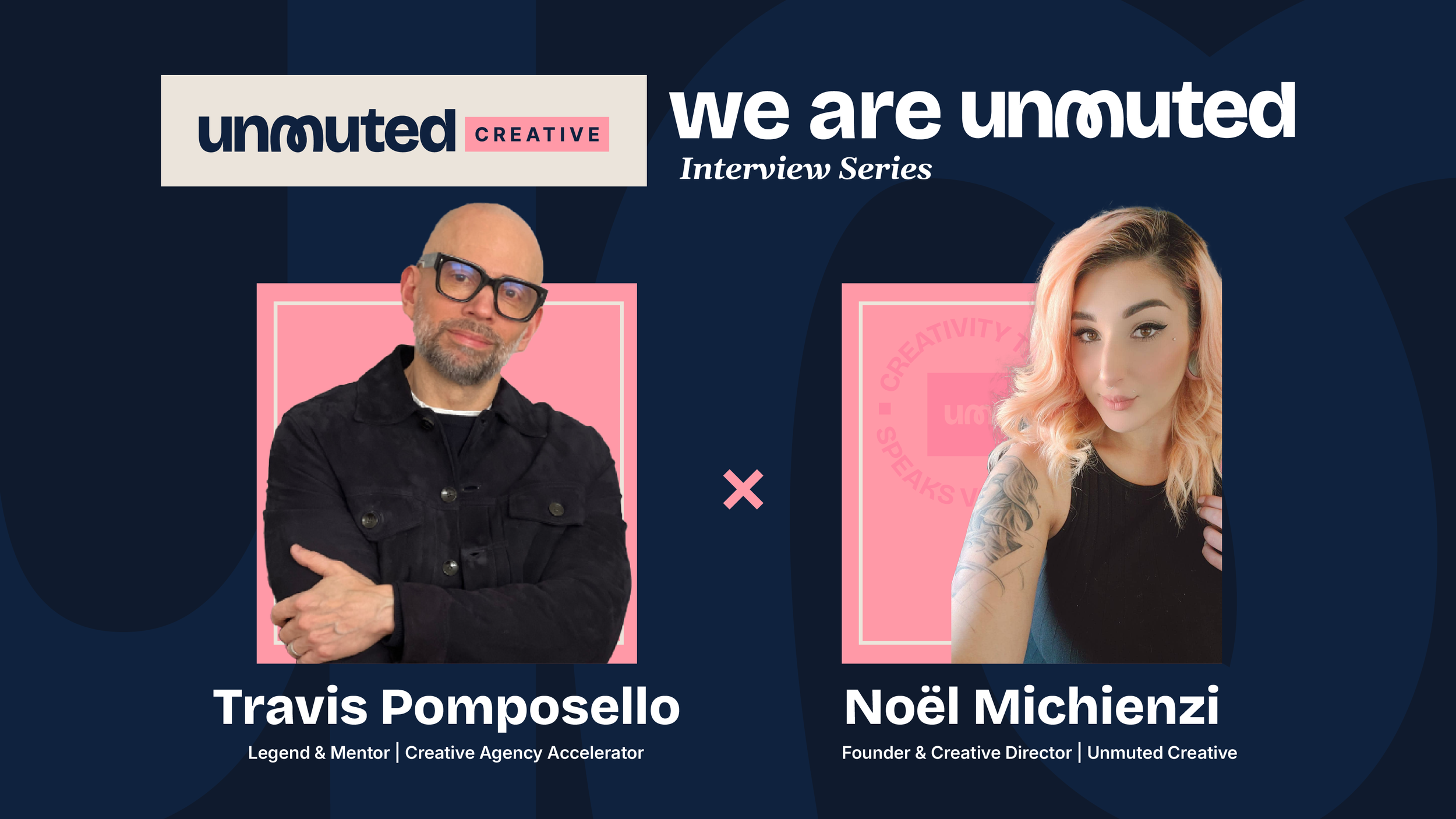We Are Unmuted: A Conversation with Travis Pomposello
When you meet someone who embodies the “unmuted” spirit, you can feel it right away, and Travis Pomposello is one of those people.
A seasoned media veteran, Travis began his career as an MTV intern in Times Square at just 18, later rising through the ranks to become a creative executive in television. After years in corporate media, he founded and led his own creative agency before moving on to coach other agency founders on how to grow and scale without losing themselves (or burning out) in the process. His career has spanned producing iconic shows, shaping brand voices, leading diversity initiatives, and mentoring the next generation of creatives.
Travis joined me as the very first guest in the We Are Unmuted interview series to talk about creativity, courage, and what it truly means to stay “unmuted” in work, leadership, and life.
Watch the full interview on our YouTube channel, or our LinkedIn newsletter to follow every We Are Unmuted interview.
Q&A with Travis Pomposello
Noël: Travis, thank you so much for being here and for saying yes to kicking off this series. Can you start by sharing a bit about yourself?
Travis: Absolutely, and thank you for having me. I’m a seasoned media veteran who worked my way up from intern to the C-suite in the television industry. After years in corporate, I realized I missed making things, so I left to start my own creative agency. Earlier this year, I exited that business and shifted to coaching agency founders, helping them grow and scale without destroying themselves in the process. Creatives often need to “unmute” when they start their own business because suddenly, the work isn’t the only thing speaking, they have to speak for themselves.
Noel: What first inspired you to enter the creative field?
Travis: I grew up in a creative home — my mom was a photographer, my dad a musician. He really wanted me to be a rock star, and I was an okay musician, but when an MTV internship opened up in the late ’80s, I jumped on it. At 18, working at MTV in Times Square felt like the closest thing to being a rock star. That experience was electric and really set the course for my career.
Noel: When you started out, whose voices did you feel were “muted” in your industry?
Travis: Early on, a lot of opportunities went to people from Ivy League or other prestigious schools, or those with radio careers — there wasn’t much room for people without that pedigree. I was lucky to convince someone to give me a shot without a fancy degree. But I had friends who felt shut out because they lacked connections or the “right” education. I worked hard to bridge the gap: buying the books my colleagues were reading, learning everything I could. I couldn’t out-educate them, but I could outwork them.
Noel: What does it mean to you to be unmuted?
Travis: It’s evolved over time. At first, it meant speaking up despite not having privilege or credentials. Later, as I became established, it meant being brave enough to share ideas or take risks, even with higher expectations. Today, it’s about paying it forward — using my experience to help others unmute their own voices. And lately, I’ve realized it’s also about unmuting my ears: listening deeply and helping others find their courage.
Noel: Was there a moment in your career when you realized you needed to speak up or do things differently?
Travis: One stands out. As an executive, I was asked to lead our first diversity initiative. Looking around, I realized there were whole groups missing from the table — women, minorities, LGBTQ+ voices. We found structural reasons: lack of access to technology, male-dominated hiring channels, intimidating job descriptions. I had to “unmute” and challenge HR to broaden our outreach. It wasn’t about token hires — it was about asking why talented people weren’t even getting in the door.
Noel: How has your approach to unmuting shifted as you’ve grown in leadership?
Travis: I think about legacy now. Would I leave this business — in its current state and values — to someone I love? That mindset keeps me aligned with my intrinsic motivation. My dad’s story shaped this for me: he was a brilliant musician but muted himself around finances, which left a tangle for me when he passed. I don’t want to leave behind that kind of silence. Staying unmuted means creating something ethical and transparent that others can carry forward.
Noel: Who or what gives you the courage to stay unmuted?
Travis: My son, for sure — I want him to see integrity in action. There’s also the idea of legacy: I’d rather be remembered for impact than just success. It’s not about the money or titles you leave behind; it’s about the values people associate with your name.
Noel: I love ending on this: if your voice had a volume setting in life, where would it be right now?
Travis: I’d say a nine. As a solopreneur, I can’t turn the volume down — especially with founders relying on my experience. And in this age of AI, creatives need to unmute their imagination more than ever. That’s the one thing no algorithm can replace.
Final Thoughts
Travis’s journey is a reminder that unmuting isn’t a one-time decision, it’s a practice. Whether you’re standing up for yourself, advocating for others, or sharing the lessons you’ve learned along the way, choosing to speak, create, and listen with courage builds a legacy that lasts.
To watch the full interview and more, subscribe to the ‘We Are Unmuted’ newsletter below, through our LinkedIn Newsletter, or our YouTube channel.


